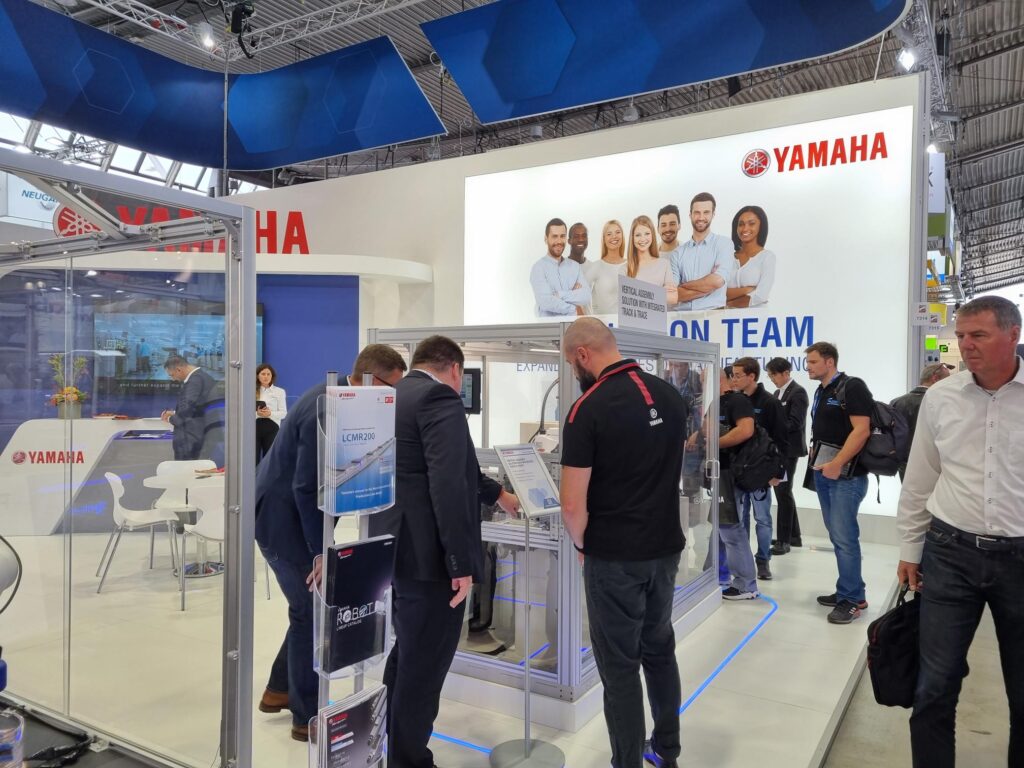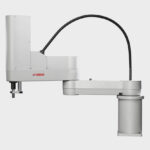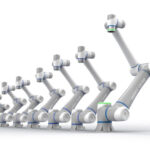ASIA ELECTRONICS INDUSTRYYOUR WINDOW TO SMART MANUFACTURING
Yamaha Robotics Unveils 7-axis Cobot at Motek 2023
Yamaha Robotics FA Section took the wraps off its prototype 7-axis collaborative robot (cobot) at Motek 2023 in Stuttgart, Germany. At the same time, it demonstrated precise, high-speed handling of large prismatic modules for electric vehicle (EV) batteries. In addition, two demonstrations featuring LCMR200 programmable modules showed how flexible workpiece transportation enables compact, automated assembly cells that enhance traceability and simplify maintenance.

Yamaha’s new cobot is ready for the next era of collaborative automation. Mainly, it highlighted the cobot’s seventh axis that enhances dexterity and introduces unique innovations. Among these, human-sense technology provides intuitive contextual awareness to assist positioning and handling of items. Specifically, this feature enhances cobot autonomy, accuracy, productivity, and safety.
“Our team of experts spoke to many visitors throughout the event. They explained how our robots combine outstanding reliability, innovative technologies, and the ability to choose from many product and configuration options,” said Tatsuro Katakura, Sales Manager, Yamaha Motor Europe Robotics Business, Factory Automation Section.
“With the added benefits of our local engineering expertise, supported through our global organization, we make building advanced automation solutions faster, easier, and more competitive,” Katakura continued.
Mainly, Yamaha Robotics worked with system integrator partner JP Industrieanlagen to develop the 35kg EV battery module handling solution. Specifically, it features the YK1200X SCARA, which automates end-of-line testing and final battery assembly. It highlights 7.5m/s speed, 0.05mm repeatability, and high payload capacity. Also, Yamaha’s YK1200X SCARA robot raises, lowers, and positions the 35kg modules quickly and accurately. Its ability to directly align the module electrical terminals in the test fixture minimizes test cycle time. Meanwhile, precision stacking eases final assembly and wiring of the battery pack.
Mainly, the two LCMR200 demonstrations highlighted the optional vertical and horizontal circulation units. Specifically, they allow space-saving bidirectional assembly lines to operate in two directions to save space and boost efficiency. The broad functional scope of the LCMR200, as a material transport system for flexible assembly grid solutions, enables users to build advanced, high-productivity manufacturing facilities.
Moreover, LCMR200 sliders have electronically programmable speed, acceleration, and stop positions, allowing easy setup and flexibility. In addition, each has a unique ID that permits real-time awareness of location and status. This feature enhances traceability, eases process control, and facilitates equipment maintenance.
“We are pleased to have shown Motek’s visitors how industrial robots enable fast, efficient and flexible smart manufacturing in diverse industries from automotive to consumer electronics, pharmaceuticals, textiles, and food production and packaging,” concluded Katakura.




